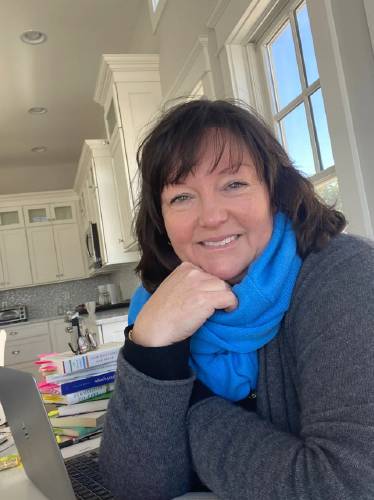Creating a more grief-informed culture

MEGHAN JARVIS
| Published: 02-18-2024 4:00 PM |
Meghan Riordan Jarvis is no stranger to trauma, but until 2019, her familiarity with it was rooted in the work she had done with clients over the course of two decades as a therapist.
Then, trauma came knocking on her door when she was confronted with the death of her mother while they were on a family vacation together, just two years after her father died from cancer. As Jarvis grappled with the aftershocks of these losses, it became clear that she was dealing with trauma symptoms that were only worsening with time and would require professional intervention.
She ultimately checked herself into the same inpatient trauma treatment facility that she had referred countless clients to over the years, and reemerged inspired to teach and speak in public platforms about the importance of creating a more grief-informed culture. Today, she describes herself as a trauma-informed therapist specializing in grief and loss.
Jarvis, who is originally from Massachusetts and attended Phillips Exeter Academy in New Hampshire before eventually settling down in the Washington, D.C. area, is a psychotherapist and educator with over 20 years of clinical experience and training in a variety of intensive somatic treatment modalities, a two-time TEDx speaker and sought-after keynote speaker, and host of a podcast called “Grief Is My Side Hustle.”
As founder of MRJ Consulting, she also offers public and private sector consultation to leadership teams, working regularly with Fortune 500 companies to address the many ways grief impacts the workplace. She has now turned her attention to writing as another way to share her story while helping others navigate their own mental health struggles.
Her new book, “End of the Hour: A Therapist’s Memoir,” delves into her own personal experiences with trauma, grief, inpatient treatment, and her hard-won healing journey – offering an account of what happens when a trauma therapist is traumatized by loss.
Q. You have been in the mental health field for over 20 years. Did you always want to be a therapist, or was there a catalyst in your life that put you onto that path?
A. I came to therapy after a breakup in my 20s. My heart was broken, and I could also tell that my inability to bounce back seemed different than my friends. I went because I was worried about myself, but I didn’t expect much. I fell in love with learning about myself, and the process of self-reflection, and trying to live differently. It was my therapist who first suggested I might make it my life’s work. I was scared, but I knew it was my life’s work.
Article continues after...
Yesterday's Most Read Articles
 With Concord down to one movie theater, is there a future to cinema-going?
With Concord down to one movie theater, is there a future to cinema-going?
 “It’s beautiful” – Eight people experiencing homelessness to move into Pleasant Street apartments
“It’s beautiful” – Eight people experiencing homelessness to move into Pleasant Street apartments
 No deal. Laconia buyer misses deadline, state is out $21.5 million.
No deal. Laconia buyer misses deadline, state is out $21.5 million.
 Quickly extinguished fire leaves Concord man in critical condition
Quickly extinguished fire leaves Concord man in critical condition
 Concord police ask for help in identifying person of interest in incidents of cars being keyed during Republican Party event
Concord police ask for help in identifying person of interest in incidents of cars being keyed during Republican Party event
 Update: Victim identified in Lantern Lane fire in Concord
Update: Victim identified in Lantern Lane fire in Concord
Q. What was the most challenging part of writing your memoir “End of the House”?
A. There is a scene in the book where I have to leave my mother’s house after her death, and I am starting to get ill. It was a grueling 13 hours in the car. My PTSD was starting to really take hold. I was getting sick and I knew it. It was hard to write because for a long time my mind wouldn’t release the memories. Eventually it was hard because when the memories came back, it was just so painful.
Q. What did you learn, both an bout yourself and about your clients, through that experience?
A. Experiencing grief in the profound way that my clients have has made me a better therapist and a better person. It’s like I went to the country I’d been studying about for two decades and finally understood what the mountain air felt like. Having said that, I don’t have as many clients as I used to. I do a lot more corporate work now.
Q. Can you offer any insights as to why the mental health system is so difficult to navigate and what people can do if they need help but aren’t sure where to turn, or are experiencing barriers to accessing care?
A. The barriers to access are so real. There are not enough clinicians, we don’t know what we need them to be trained in — and so many are not trained in grief at all — and it’s expensive. My best advice is to ask everyone for help. Ask your friend who they see, ask the insurance company who you can see, call local clinics and get on waitlists. Expect it to be hard and an effort, and if you can, ask your people to help in every way they can.
Q. As someone who has sat both in the therapist’s chair and on the patient’s couch, what would you say to someone struggling in their own journey with mental health, trauma and/or grief?
A. I would tell them that bad things feel bad. You are not failing because it feels bad. You will grieve forever, but it will not always feel this terrible. You will grow your capacity and your skill at grieving. You will not always feel this way. Keep going. Ask for help. You are doing amazing.
Julia Morin is a writer and a grief specialist, educator and advocate residing in New Hampshire.
These articles are being shared by partners in The Granite State News Collaborative. For more information visit collaborativenh.org.


 Voice of the Pride: Merrimack Valley sophomore Nick Gelinas never misses a game
Voice of the Pride: Merrimack Valley sophomore Nick Gelinas never misses a game With less than three months left, Concord Casino hasn’t found a buyer
With less than three months left, Concord Casino hasn’t found a buyer Kearsarge Middle School drone team headed to West Virginia competition
Kearsarge Middle School drone team headed to West Virginia competition Phenix Hall, Christ the King food pantry, rail trail on Concord planning board’s agenda
Phenix Hall, Christ the King food pantry, rail trail on Concord planning board’s agenda
